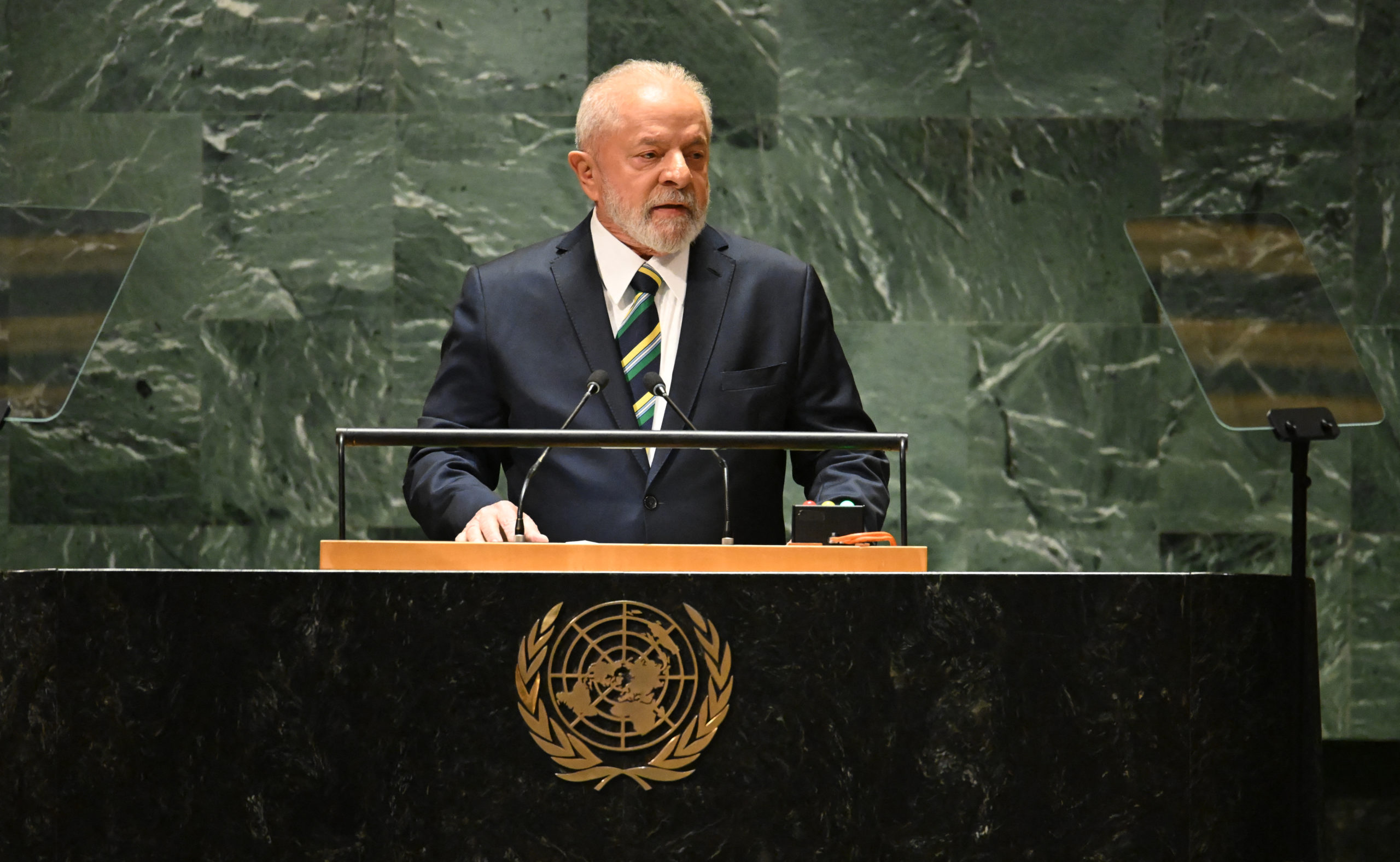At UN, Lula commits to combating racism and criticizes the lack of global engagement to confront inequality
Brazilian president also addressed the need for reforms in global governance and tackling the climate crisis; see the analysis by Conectas
 Brazilian President Luiz Inacio Lula da Silva addresses the 78th United Nations General Assembly at UN headquarters in New York City on September 19, 2023. (Photo by TIMOTHY A. CLARY / AFP)
Brazilian President Luiz Inacio Lula da Silva addresses the 78th United Nations General Assembly at UN headquarters in New York City on September 19, 2023. (Photo by TIMOTHY A. CLARY / AFP)
President Luiz Inácio Lula da Silva gave a speech at the 78th UN General Assembly in New York, where he confirmed the commitment of his government to achieving racial equality in Brazil and criticized global inaction in combating inequality.
Since 1955, the Head of State of Brazil has opened the session of speeches in the General Assembly. This was the eighth time that Lula, in his third term as President of the Republic, stood at the podium of the United Nations to inaugurate one of the main global forums to discuss the major challenges related to the promotion of peace, democracy and human rights.
Combating racism and gender inequality
“Racism, intolerance and xenophobia have spread, encouraged by new technologies created supposedly to bring us closer together.” “We want to achieve racial equality in Brazilian society by means of an eighteenth goal that we will adopt voluntarily,” said Lula in reference to the UN Agenda 2030 for Sustainable Development, which consists of 17 goals to achieve sustainability.
The president also said that his government will combat all forms of violence against women and defend the rights of the LGBTQIA+ community and people with disabilities. According to the international relations expert Camila Asano, executive director of Conectas, it was very important for the president to highlight the fight against gender and racial inequality in his speech. “Tackling racial and gender inequality in Brazil will only be possible when historically oppressed populations occupy decision-making positions, such as in the Judiciary. Women, black people, indigenous groups and the LGBTQIA+ community need to be at the center of discussions in the country and the world.”
Organizations from the black movement and civil society are currently leading a campaign for Lula to appoint a black woman to fill the vacancy in the Supreme Court created by the retirement of Justice Rosa Weber. In its 132-year history, racial and gender diversity in the Court has been extremely low.
Commitment to end inequality
Lula used the term inequality at least 16 times in his speech and he criticized the lack of global action to combat the various different types of inequality. “We need, above all else, to overcome resignation, which makes us accept such injustice as a natural phenomenon. To overcome inequality, there is a lack of political will from those who govern the world.”
He also criticized international bodies, including the UN itself, the IMF and the World Bank, and stated that Brazil “is being reunited with itself, with our region, with the world and with multilateralism”. The reform of international bodies to enable greater participation by countries from the Global South in decision-making arenas is an historic platform of Brazilian diplomacy.
Asano stated that “if Brazil wants to return to the center of the debate in multilateralism, it is essential for the country to commit to an unwavering defense of the international human rights system and its international treaties, including those dedicated to combating crimes against humanity such as the Statute of Rome”.
Tackling the climate crisis
Climate issues also occupied a key part of the speech given by Lula, who highlighted energy transition as an asset that Brazil has to combat the climate crisis. According to Asano, this transition needs to be fair and inclusive. “Brazilian civil society has witnessed human rights violations in indigenous and quilombola communities near wind farms, for example.” She said “it is crucial to include native peoples in the debate on the climate crisis, something that did not feature in the president’s speech. In spite of this, Lula has expressed interest in the topic and he created the Ministry of Indigenous Peoples, which will have material conditions to develop activities to defend the constitutional rights of ancestral communities”.
While speaking about the climate crisis, Lula sent a message to developed countries, which are the leading emitters of carbon: “taking action against climate change implies thinking about tomorrow and facing historical inequalities. Rich countries grew based on a model with high levels of climate-damaging gas emissions. The climate emergency makes it urgent to correct course and implement what has already been agreed. This is why we speak of common but differentiated responsibilities.”
In Asano’s assessment, when talking about the historic responsibility of countries for the climate crisis and Brazil’s role in developing sustainable ways to tackle climate problems, it is hoped that the Brazilian government will adopt a corrective stance, on both the domestic and international front, regarding the excessive use of fossil fuels and the review of new oil exploration sites, particularly in sensitive regions such as the mouth of the Amazon. According to her, “President Lula frustrated expectations by not committing to a review of Brazil’s Nationally Determined Contribution (NDC), an essential step for the country to comply with the Paris Agreement and correct the “climate backpedaling” of the Bolsonaro government.


